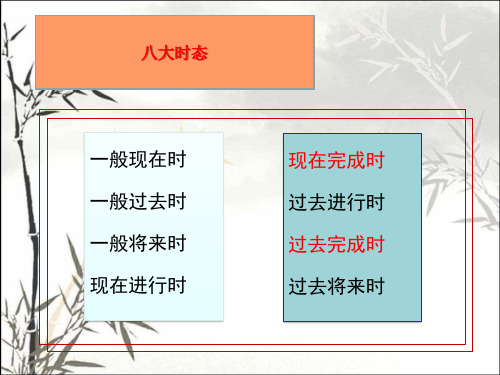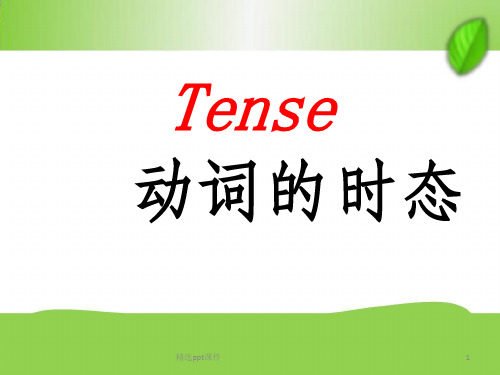最新初中英语八大时态课件
合集下载
八大时态 PPT课件

八大时态
一般现在时 一般过去时
现在完成时
过去进行时 过去完成时 过去将来时
一般将来时
现在进行时
一般现在时
表示经常性或习惯性的动作
表示现在的状态
表示普遍事实或真理
一般现在时结构
当主语不是第三人称单数时: 肯定句 :主语+动词原形+其它 否定句 :主语+don't+动词原形+其它 一般疑问句: Do+主语+动词原形+其它
I leave home for school at 7:00 every morning. She/He/It gets up at 6:00 every day.
一般过去时
表示过去某个时间发生的动作或存在的状态,长和表 示过去的时间状语连用 例如:yesterday,last night,in+过去的年份, two days ago,before,the age of,the day before yesterday等。 也表示过去经常或反复发生的动作,长和表示频度的 时间状语连用 例如:often,always,once a week
2)This is the… that…结构,that从句要用现在完成时. This is the best film that I've (ever) seen. 这是我看过的最好的电影。 This is the first time (that) I've heard him sing. 这是我第一次听他唱歌。
用于现在完成时的句型
1)It is the first / second time…. that…结构中的从句部分,用现在完 成时。 It is the first time that I have visited the city. It was the third time that the boy had been late.
一般现在时 一般过去时
现在完成时
过去进行时 过去完成时 过去将来时
一般将来时
现在进行时
一般现在时
表示经常性或习惯性的动作
表示现在的状态
表示普遍事实或真理
一般现在时结构
当主语不是第三人称单数时: 肯定句 :主语+动词原形+其它 否定句 :主语+don't+动词原形+其它 一般疑问句: Do+主语+动词原形+其它
I leave home for school at 7:00 every morning. She/He/It gets up at 6:00 every day.
一般过去时
表示过去某个时间发生的动作或存在的状态,长和表 示过去的时间状语连用 例如:yesterday,last night,in+过去的年份, two days ago,before,the age of,the day before yesterday等。 也表示过去经常或反复发生的动作,长和表示频度的 时间状语连用 例如:often,always,once a week
2)This is the… that…结构,that从句要用现在完成时. This is the best film that I've (ever) seen. 这是我看过的最好的电影。 This is the first time (that) I've heard him sing. 这是我第一次听他唱歌。
用于现在完成时的句型
1)It is the first / second time…. that…结构中的从句部分,用现在完 成时。 It is the first time that I have visited the city. It was the third time that the boy had been late.
英语时态8种基本时态讲解.ppt课件

4)动词过去式变化规则。 a)一般情况下的词加-ed. work---worked call----called b)以不发音的字母e结尾的单词直接加-d . live----lived change----changed smoke----smoked die----died graduate----graduated drive----drove
8.过去完成时 表示动作发生在过去某一时间之前已经完成的动作或状态, 强调“过去的过去”, 常与 by the time, by the end of…,before , by 等引导时间的状语连用。
基本结构 主语+ had + 动词过去分词 + 其他成分 When I got to the cinema yesterday the film had begun already. He had learned English before he came here.
现在完成时与一般过去时的区别: 1)现在完成时侧重于对现在的影响;而一般过去时侧重于某一动作发生在过去某个时间或某段时间。即现在完成时侧重于现在的结果,而一般过去时侧重于动作发生的时间。例如:
I have seen the film. 我看过这部电影。(现在我仍记得电影的内容) I saw the film three days ago. 三天前我看了这部电影。(强调是三天前,而不是别的什么时候看的电影)
be going to含有“打算,准备”的意思,而will则没有这个意思, She is going to lend us her book. He will be here in half an hour.
be about to+V.原形(意为马上做某事,在时间上指最近的将来) I am about to leave school. 不能与表示时间的副词连用。 They are about to set out.(√) They are about to set,变y为i加-ed. study----studied carry----carried cry----cried try----tried d)以元音字母+y结尾的单词直接加-ed. play----played stay----stayed
8.过去完成时 表示动作发生在过去某一时间之前已经完成的动作或状态, 强调“过去的过去”, 常与 by the time, by the end of…,before , by 等引导时间的状语连用。
基本结构 主语+ had + 动词过去分词 + 其他成分 When I got to the cinema yesterday the film had begun already. He had learned English before he came here.
现在完成时与一般过去时的区别: 1)现在完成时侧重于对现在的影响;而一般过去时侧重于某一动作发生在过去某个时间或某段时间。即现在完成时侧重于现在的结果,而一般过去时侧重于动作发生的时间。例如:
I have seen the film. 我看过这部电影。(现在我仍记得电影的内容) I saw the film three days ago. 三天前我看了这部电影。(强调是三天前,而不是别的什么时候看的电影)
be going to含有“打算,准备”的意思,而will则没有这个意思, She is going to lend us her book. He will be here in half an hour.
be about to+V.原形(意为马上做某事,在时间上指最近的将来) I am about to leave school. 不能与表示时间的副词连用。 They are about to set out.(√) They are about to set,变y为i加-ed. study----studied carry----carried cry----cried try----tried d)以元音字母+y结尾的单词直接加-ed. play----played stay----stayed
初中英语八大时态-讲解ppt课件

D.have;left
精选ppt课件
18
六、过去将来时
1.用法:从过去看将要发生的动作。
2.结构:would was/were/going to +v.(原型)
例题
1.--What did he say yesterday?
--He said he____to Sydney next week.
A.goes B.will go
在有关的过去动作用现在完成,与现在 无关的过去动作用一般过去。)
4.易错点:
1 have gone to+地点,表示“去了某地”。
(人已走,尚未回。只用于第三人称。)
They have gone to Europe.
(They are not here.)
精选ppt课件
22
2 have been to+地点,表示“去过某
C.would go D.are going
2.--Did your son fail his English exam once again?
--Yes, but he told me he____hard next term.
A.studies B.is studying C.wil--When____we have the meeting? ---At 8.
A.are B.shall
C.would D.will
4.--When___you___for London? --Next week.
A.will;leaving
B.are;leaving
C.shall;leave
A.are work
B.are worked
C.work
英语八大时态PPT课件(详细版)

b
15
He is a lazy man . He ____the dirty jeans every day.(2014 )
A. always wears B. always wearing C. always to wear D. is always wearing
You will know the truth after you ___him.(2013) A. see B. will see C. are seeing D.to see
b
16
三、一般过去时
1、构成 一般过去时用动词的过
去式表示。除系动词be的过去式 有人称和数的变化外,其他动词 的过去式无人称和数的变化。
b
17
2、用法
※表示过去已经发生的动作,现在 已经结束,常与相应的过去时间状 语连用。 Tom fell ill last night , and he had to stay at home.
【翻译】
我今年20岁,住在北京。 I am twenty years old this year , and I live in Beijing.
火车将在一个小时后(in an hour)出发(set off)。 The train sets off in an hour.
她每天都走路上学。 She walks to school every day. 或:She goes to school on foot every day.
If it doesn’t rain tomorrow,we’ll
go shopping.
பைடு நூலகம்
b
6
常与一般现在时连用的时间状语有:
often 经常
初中英语八大时态课件(共77张PPT)

exercise
把下列句子改为一般疑问句
1.He has a meeting on Sundays . Does he have a meeting on Sundays ?
2.He goes to school at seven in the morning . Does he go to school at seven in the morning?
2. 当 主 语 是 单 数 第 三 人 称 时 , 它与助动词Does有关,但是 动词谓语一定要恢复为原形。 当主语是其他人称时,它与 助动词Do有关。
I like English. She likes it very much. We go to work by bike.
否定句
I don’t like English.
3.My father and mother go out for lunch on Sundays. Do your father and mother go out for lunch on Sundays ?
4.We do our homework after school.
Do you do your homework after school ?
2) I will return home as soon as I finish my task.
2、be going to + v原形
①表示打算做某事 ②表示现在已经有迹象表明将要发生某事。
--- What __a_re__y_o_u__g_o_in_g__t_o_do this evening? --- I am going to do my lessons.
Review of Tenses
英语时态8种基本时态讲解ppt课件

• c)----He joined the army in 1990. • -----He didn’t joined the army in 1990. • -----Did he join the army in 1990? • -----Yes ,he did ./No ,he didn’t.
认识到了贫困户贫困的根本原因,才 能开始 对症下 药,然 后药到 病除。 近年来 国家对 扶贫工 作高度 重视, 已经展 开了“ 精准扶 贫”项 目
4.过去将来时
• 过去将来时是立足于过去某时,从 过去的观点看将要发生的动作或状 态。主要用于宾语从句中。
认识到了贫困户贫困的根本原因,才 能开始 对症下 药,然 后药到 病除。 近年来 国家对 扶贫工 作高度 重视, 已经展 开了“ 精准扶 贫”项 目
• c)以辅音字母+y结尾的单词变y为i加 -es.
• Study---studies carry-carries • d)以元音字母+y结尾的单词直接加-s. • play---plays stay---stays
• 句型结构:主语+will/shall+V.原形 +…(第一人称用shall)
• I shall go to Shanghai tomorrow. • They will have a meeting next week. • ----She will be 20 years old.
认识到了贫困户贫困的根本原因,才 能开始 对症下 药,然 后药到 病除。 近年来 国家对 扶贫工 作高度 重视, 已经展 开了“ 精准扶 贫”项 目
认识到了贫困户贫困的根本原因,才 能开始 对症下 药,然 后药到 病除。 近年来 国家对 扶贫工 作高度 重视, 已经展 开了“ 精准扶 贫”项 目
认识到了贫困户贫困的根本原因,才 能开始 对症下 药,然 后药到 病除。 近年来 国家对 扶贫工 作高度 重视, 已经展 开了“ 精准扶 贫”项 目
4.过去将来时
• 过去将来时是立足于过去某时,从 过去的观点看将要发生的动作或状 态。主要用于宾语从句中。
认识到了贫困户贫困的根本原因,才 能开始 对症下 药,然 后药到 病除。 近年来 国家对 扶贫工 作高度 重视, 已经展 开了“ 精准扶 贫”项 目
• c)以辅音字母+y结尾的单词变y为i加 -es.
• Study---studies carry-carries • d)以元音字母+y结尾的单词直接加-s. • play---plays stay---stays
• 句型结构:主语+will/shall+V.原形 +…(第一人称用shall)
• I shall go to Shanghai tomorrow. • They will have a meeting next week. • ----She will be 20 years old.
认识到了贫困户贫困的根本原因,才 能开始 对症下 药,然 后药到 病除。 近年来 国家对 扶贫工 作高度 重视, 已经展 开了“ 精准扶 贫”项 目
认识到了贫困户贫困的根本原因,才 能开始 对症下 药,然 后药到 病除。 近年来 国家对 扶贫工 作高度 重视, 已经展 开了“ 精准扶 贫”项 目
初中8个时态 ppt

一般现在时用法 习惯活动 现在情况 客观事实 主将从现
I get up at six every morning. They are very busy. He needs help. The moon moves round the earth. We’ll go there if it doesn’t rain. He’ll call you when he arrives.
现在完成时用法
I can’t find my pen. I have lost 过影响现 it. Have you finished it yet ? He has worked here for a year. 过延到现 I have been in this school since 1999 . He has been to China twice. 两“去” He isn’t here. He has gone to the library.
①一般现在时:表示现在经常反复发生的动作、存在 的状态或习惯性的动作。动词写原形或第三人称单数 形式,即主语为第三人称单数时,动词一般要加-s/es, 与名词复数规则构成类似。如果动词为行为动词,构 成问句、否定句需加助动词/do/does;一般现在时的 时间标志词有: often,always,sometimes,usually,every day,on Sundays等;另外表示主语具有的性格、能力、特征, 表客观事实和普遍真理,表现在发生的具体动作等也 用一般现在时;在时间和条件状语从句中常用一般现 在时代替一般将来时;预先计划安排好的将来行为也 可用一般现在时;状态感觉动词如:be,love,want, hope,understand等只用一般现在时,不用进行时。
过去完成时,表示在过去某一时间或动作之 前已完成的动作或存在的状态。过去完成 时的构成为:had+done;过去完成时的时 间状语常用by加过去点时间,by the end of 加过去段时间,before加过去点时间表 示,有时用when,before,after等引导的 时间从句中。
初中英语八种时态讲解最新优质ppt课件

语法专题(一)
时态
1
一般现在时 一般过去时 现在进行时 过去进行时 现在完成时 过去完成时 一般将来时 过去将来时 2
一般现在时
3
一、一般现在时:
概念:经常、反复发生的动作或行为及现
在的某种状况。
时间状语:
always, usually, often, sometimes, every
(day, year, month…), once a week, on Sun
10
are) free tomorrow.
10.I will go there when I _____(have will have, has) time tomorrow. 11.He won't come to the party unle he _____(be, will be, am, is, are) invi 12.I'll wait here until my mother ____(come, comes, will come) back. 13.Please return the book to the lib as soon as you ______(finish, finishe will finish) reading it. 14.Once you _____(see, sees, will see him, you will never forget him.
stud→y studies carry→carries fly→flies
9
1. He______(be, am, is, are) a teacher at No. 2 Middle School. 2. He______(have, has) classes in the afternoon. 3.He______(get, gets) up at half past six every morning. 4.He always _____(come, comes ) to school on time. 5.He ______(study, studies) very hard at his lesson. 6. One and two _____(be, is, are) three. 7. Blue and yellow _____(make, makes) green. 8.The earth _____(move, moves) round the sun. 9.I will go there if I ____( be, will be, am, is,
时态
1
一般现在时 一般过去时 现在进行时 过去进行时 现在完成时 过去完成时 一般将来时 过去将来时 2
一般现在时
3
一、一般现在时:
概念:经常、反复发生的动作或行为及现
在的某种状况。
时间状语:
always, usually, often, sometimes, every
(day, year, month…), once a week, on Sun
10
are) free tomorrow.
10.I will go there when I _____(have will have, has) time tomorrow. 11.He won't come to the party unle he _____(be, will be, am, is, are) invi 12.I'll wait here until my mother ____(come, comes, will come) back. 13.Please return the book to the lib as soon as you ______(finish, finishe will finish) reading it. 14.Once you _____(see, sees, will see him, you will never forget him.
stud→y studies carry→carries fly→flies
9
1. He______(be, am, is, are) a teacher at No. 2 Middle School. 2. He______(have, has) classes in the afternoon. 3.He______(get, gets) up at half past six every morning. 4.He always _____(come, comes ) to school on time. 5.He ______(study, studies) very hard at his lesson. 6. One and two _____(be, is, are) three. 7. Blue and yellow _____(make, makes) green. 8.The earth _____(move, moves) round the sun. 9.I will go there if I ____( be, will be, am, is,
初中英语八种时态讲解(课堂PPT)

carry→carries
fly→flies
9
1. He______(be, am, is, are) a teacher at No. 2 Middle School. 2. He______(have, has) classes in the afternoon. 3. He______(get, gets) up at half past six every morning. 4. He always _____(come, comes ) to school on time. 5. He ______(study, studies) very hard at his lesson. 6. One and two _____(be, is, are) three. 7. Blue and yellow _____(make, makes) green. 8. The earth _____(move, moves) round the sun. 9. I will go there if I ____( be, will be, am, is,
词。)⑤在时间状语从句和条件 状语从句中,主句用一般将来时 (will+动词原形),从句中用一般
现在时表将来。(主将从现)6
当主语是第三人称 时,谓语动词要用 第三人称单数形式, 加-s/es。除此之外 都用动词原形。
7
动词第三人称单数 形式变化规则
8
规则
Hale Waihona Puke 例子一般在词尾加-s,(清辅音后 Play→plays 读/s/,在浊辅音后读/z/; leave→leaves 在t后读/ts/,在d后读/dz/。) swim→swims
助动词do提问,如主语为第三人称单数,
初中英语八种时态讲解ppt课件

现在时表将来。(主将从现)6
当主语是第三人称 时,谓语动词要用 第三人称单数形式, 加-s/es。除此之外 都用动词原形。
7
动词第三人称单数 形式变化规则
8
规则
例子
一般在词尾加-s,(清辅音后 Play→plays 读/s/,在浊辅音后读/z/; leave→leaves 在t后读/ts/,在d后读/dz/。) swim→swims
助动词do提问,如主语为第三人称单数,
则用does,同时,还原行为动词。
4
什么情况下用?
5
①表示经常或习惯性的动作或存 在的状态。②表示主语通常的能 力、兴趣爱好、和性格特征。③ 表示客观的事实或真理。④表示 按照时刻表或已经计划安排好的 将来行为。(只限于是go, come, leave, arrive, begin, start, take off, stop, be等表示开始或移动意义的 词。)⑤在时间状语从句和条件 状语从句中,主句用一般将来时 (will+动词原形),从句中用一般
work→worked
结尾是e的动词在末尾加-d
like→liked live→lived hope→hoped
末尾只有一个辅音字母的重读闭音 plan→planned 节,先双写这个辅音字母,再加-ed stop→stopped
drop→dropped
结尾是“辅音字母+y”的动词,先 study→studied
11
一般过去时
12
概念:过去某个时间里发生的动作或 状态;过去习惯性、经常性的动作、 行为。 时间状语:ago, yesterday, the day before yesterday, last week(year, night, month…), in 1989, just now, at the age of 5, one day, long long ago, once upon a time, etc. 基本结构:①be动词;②行为动词 否定形式:①was/were+not;②在行为 动词前加didn't,同时还原行为动词。 一般疑问句:①was或were放于句首; ②用助动词do的过去式did 提问,同时 还原行为动词。
当主语是第三人称 时,谓语动词要用 第三人称单数形式, 加-s/es。除此之外 都用动词原形。
7
动词第三人称单数 形式变化规则
8
规则
例子
一般在词尾加-s,(清辅音后 Play→plays 读/s/,在浊辅音后读/z/; leave→leaves 在t后读/ts/,在d后读/dz/。) swim→swims
助动词do提问,如主语为第三人称单数,
则用does,同时,还原行为动词。
4
什么情况下用?
5
①表示经常或习惯性的动作或存 在的状态。②表示主语通常的能 力、兴趣爱好、和性格特征。③ 表示客观的事实或真理。④表示 按照时刻表或已经计划安排好的 将来行为。(只限于是go, come, leave, arrive, begin, start, take off, stop, be等表示开始或移动意义的 词。)⑤在时间状语从句和条件 状语从句中,主句用一般将来时 (will+动词原形),从句中用一般
work→worked
结尾是e的动词在末尾加-d
like→liked live→lived hope→hoped
末尾只有一个辅音字母的重读闭音 plan→planned 节,先双写这个辅音字母,再加-ed stop→stopped
drop→dropped
结尾是“辅音字母+y”的动词,先 study→studied
11
一般过去时
12
概念:过去某个时间里发生的动作或 状态;过去习惯性、经常性的动作、 行为。 时间状语:ago, yesterday, the day before yesterday, last week(year, night, month…), in 1989, just now, at the age of 5, one day, long long ago, once upon a time, etc. 基本结构:①be动词;②行为动词 否定形式:①was/were+not;②在行为 动词前加didn't,同时还原行为动词。 一般疑问句:①was或were放于句首; ②用助动词do的过去式did 提问,同时 还原行为动词。
初中英语八大时态讲解_图文

2 have been to+地点,表示“去过某地”
。(人已回) I have been to Europe. (I am not in Europe now.)
3 have been in+地点+时间段,表示“在/ 来某地多久”。
I have been in Europe for three weeks. (I am now still in Europe .)
go there get home open close get to know borrow buy
be there be home be open be closed know keep have
1.The film began 5 The film_h_a_s b_e_en_o_n__ for 5
• 9.They got to know 10 They_h_av_e_k_n_o_w_n__since 10
years ago.
years ago.
• 10.I borrowed the book a I_h_a_v_e _k_e_p_t _the book for a
week ago.
week.
二、一般过去时
1.用法:过去的动作或状态。
2.标志词:
yesterday, the day before yesterday,
three days ago, last night/week/month…,in the past;just
now=a moment ago
例题
Li Ming didn’t understand what American people
4.He joined the club 3 He__h_as_b_e_en_i_n__the club for
- 1、下载文档前请自行甄别文档内容的完整性,平台不提供额外的编辑、内容补充、找答案等附加服务。
- 2、"仅部分预览"的文档,不可在线预览部分如存在完整性等问题,可反馈申请退款(可完整预览的文档不适用该条件!)。
- 3、如文档侵犯您的权益,请联系客服反馈,我们会尽快为您处理(人工客服工作时间:9:00-18:30)。
1. We often __p_la_y_ (play) in the playground. 2. He _g_et_s_ (get) up at six o’clock. 3. _D_o_ you b_r_u_s_h (brush) your teeth every morning? 4. What d_o_e_she usually_d_o_ (do) after school? 5. Danny_s_t_ud_i_e_s (study) English, Chinese, Maths, Science and Art at school. 6. Mike sometimes _g_o_es__(go) to the park with his sister. 7. She w_a_t_ch_e_s (watch) TV with his parents every evening. 8.D__oe_s_ Mike _r_ea_d_(read) English every day?
I often go there. You like the music. He goes to work by bus . We /You/They like it.
Do you often go there ? Do you like the music.? Does he go to work by bus ? Do you/they like it?
I’m not a teacher
You are a worker 否定句 You aren’t a worker
She is a doctor
She isn’t a doctor.
We are friends.
We aren’t friends.
is not=isn’t
are not=aren’t
把下列句子改为否定句
1.My father has an egg for breakfast . My father doesn’t have an egg for breakfast .
2.Li Lei does his homework after school. Li Lei doesn’t do his homework after school.
先变y 为i,再加es
·特殊 have-has 等
写出下列动词的第三人称单数形式
help s guess es flyies makes leaves fix es swim s know s
play s
closes
go es studyies gets read s bring s watches
Review of Tenses
初中英语八大时态
教学重、难点
1、The Simple Present Tense 一般现在时态
一般现在时
表示经常发生的动作或存在的状态 常与every day , on Sundays, sometimes ,
often ,usually ,always,等连用 结构 : 1、主语+动词原形+其他 Eg. I have a meeting on Sundays . They visit their parents once a month.
I am a teacher. You are a worker. He is a student.
We are friends.
Are you a teacher?
疑 问
Are you a worker?
句 Is he a student?
Are you friends?
2.对于实意动词,疑问句要求是:当主 语是他(he),她(she),它(it)时,句子前 面加does,并把动词恢复原形;当主语 是其他人称时,句前加do ,第一人称 (I/we) 换第二人称(you)。
carryies do es wash es visit s exercise s enjoy s jump s hhaavse
一般现在时否定式
be + not don’t do / doesn’t do
II 一般现在时的否定式
1.Be 动词的否定式: be + not
I am a teacher.
注: 主语(三单)+ 动词(第三人称单数形式)+其他
Eg. 1) She likes it very much.
2) She usually goes to school at 7 o’clock every morning.
动词第三人称单数形式
·在动词后+s
· 在以s,x,ch,sh,o结尾的动词+es · 以辅音字母+y结尾的动词,
2. 当 主 语 是 单 数 第 三 人 称 时 , 它与助动词Does有关,但是 动词谓语一定要恢复为原形。 当主语是其他人称时,它与 助动词Do有关。
I like English. She likes it very much. We go to work by bike.
否定句
I don’t like English.
exercise
把下列句子改为一般疑问句
1.He has a meeting on Sundays . Does he have a meeting on Sundays ?
2.He goes to school at seven in the morning . Does he go to school at seven in the morning?
3.My father and mother go out for lunch on Sundays. Do your father and mother go out for lunch on Sundays ?
4.We do our homework after school.
Do you do your homework after school ?
She doesn’t like it very much.
We don’t go to work by b yes 或 no 来回答的疑问句叫做一般疑问句。 一般疑问句句首的第一个词一般读得比较重。
1.对于be 动词,疑问句要求把be 提前, 第一人称变成第二人称。
3.We do our homework at home. We don’t do our homework at home .
4.They have a meeting every morning . They don’t have a meeting every morning .
用所给动词的正确形式及助动词填空
I often go there. You like the music. He goes to work by bus . We /You/They like it.
Do you often go there ? Do you like the music.? Does he go to work by bus ? Do you/they like it?
I’m not a teacher
You are a worker 否定句 You aren’t a worker
She is a doctor
She isn’t a doctor.
We are friends.
We aren’t friends.
is not=isn’t
are not=aren’t
把下列句子改为否定句
1.My father has an egg for breakfast . My father doesn’t have an egg for breakfast .
2.Li Lei does his homework after school. Li Lei doesn’t do his homework after school.
先变y 为i,再加es
·特殊 have-has 等
写出下列动词的第三人称单数形式
help s guess es flyies makes leaves fix es swim s know s
play s
closes
go es studyies gets read s bring s watches
Review of Tenses
初中英语八大时态
教学重、难点
1、The Simple Present Tense 一般现在时态
一般现在时
表示经常发生的动作或存在的状态 常与every day , on Sundays, sometimes ,
often ,usually ,always,等连用 结构 : 1、主语+动词原形+其他 Eg. I have a meeting on Sundays . They visit their parents once a month.
I am a teacher. You are a worker. He is a student.
We are friends.
Are you a teacher?
疑 问
Are you a worker?
句 Is he a student?
Are you friends?
2.对于实意动词,疑问句要求是:当主 语是他(he),她(she),它(it)时,句子前 面加does,并把动词恢复原形;当主语 是其他人称时,句前加do ,第一人称 (I/we) 换第二人称(you)。
carryies do es wash es visit s exercise s enjoy s jump s hhaavse
一般现在时否定式
be + not don’t do / doesn’t do
II 一般现在时的否定式
1.Be 动词的否定式: be + not
I am a teacher.
注: 主语(三单)+ 动词(第三人称单数形式)+其他
Eg. 1) She likes it very much.
2) She usually goes to school at 7 o’clock every morning.
动词第三人称单数形式
·在动词后+s
· 在以s,x,ch,sh,o结尾的动词+es · 以辅音字母+y结尾的动词,
2. 当 主 语 是 单 数 第 三 人 称 时 , 它与助动词Does有关,但是 动词谓语一定要恢复为原形。 当主语是其他人称时,它与 助动词Do有关。
I like English. She likes it very much. We go to work by bike.
否定句
I don’t like English.
exercise
把下列句子改为一般疑问句
1.He has a meeting on Sundays . Does he have a meeting on Sundays ?
2.He goes to school at seven in the morning . Does he go to school at seven in the morning?
3.My father and mother go out for lunch on Sundays. Do your father and mother go out for lunch on Sundays ?
4.We do our homework after school.
Do you do your homework after school ?
She doesn’t like it very much.
We don’t go to work by b yes 或 no 来回答的疑问句叫做一般疑问句。 一般疑问句句首的第一个词一般读得比较重。
1.对于be 动词,疑问句要求把be 提前, 第一人称变成第二人称。
3.We do our homework at home. We don’t do our homework at home .
4.They have a meeting every morning . They don’t have a meeting every morning .
用所给动词的正确形式及助动词填空
